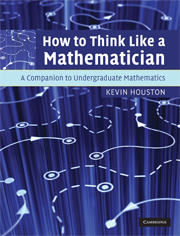Book contents
- Frontmatter
- Contents
- Preface
- I Study skills for mathematicians
- II How to think logically
- III Definitions, theorems and proofs
- 14 Definitions, theorems and proofs
- 15 How to read a definition
- 16 How to read a theorem
- 17 Proof
- 18 How to read a proof
- 19 A study of Pythagoras' Theorem
- IV Techniques of proof
- V Mathematics that all good mathematicians need
- VI Closing remarks
- Appendices
- Index
16 - How to read a theorem
from III - Definitions, theorems and proofs
- Frontmatter
- Contents
- Preface
- I Study skills for mathematicians
- II How to think logically
- III Definitions, theorems and proofs
- 14 Definitions, theorems and proofs
- 15 How to read a definition
- 16 How to read a theorem
- 17 Proof
- 18 How to read a proof
- 19 A study of Pythagoras' Theorem
- IV Techniques of proof
- V Mathematics that all good mathematicians need
- VI Closing remarks
- Appendices
- Index
Summary
The first precept was never to accept a thing as true until I knew it as such without a single doubt.
René Descartes, Le Discours de la Méthode, 1637Theorems and proofs are central to mathematics. In this chapter I will explain how to deal with a new theorem; consideration of proofs will come later.
As explained earlier, students often conceive of mathematics as being about processes applied to solve set problems, such as using a certain rule to differentiate a product or quotient, or solving a differential equation by first solving a quadratic. Higher-level mathematics moves beyond this, and statements – rather than processes or algorithms – become important.
The use of theorems in solving problems is not obvious. For instance, theorems may not be giving an algorithm. The three theorems we will use in this chapter (given below) tell more about the structure of certain mathematical objects, rather than how to apply an algorithm.
A consequence of this is that students expect theorems to tell them how to do something and so miss what the theorem is really saying.
Note that from now on our default convention will be to call any true statement a theorem and not refer to propositions and lemmas unless necessary.
- Type
- Chapter
- Information
- How to Think Like a MathematicianA Companion to Undergraduate Mathematics, pp. 109 - 115Publisher: Cambridge University PressPrint publication year: 2009

